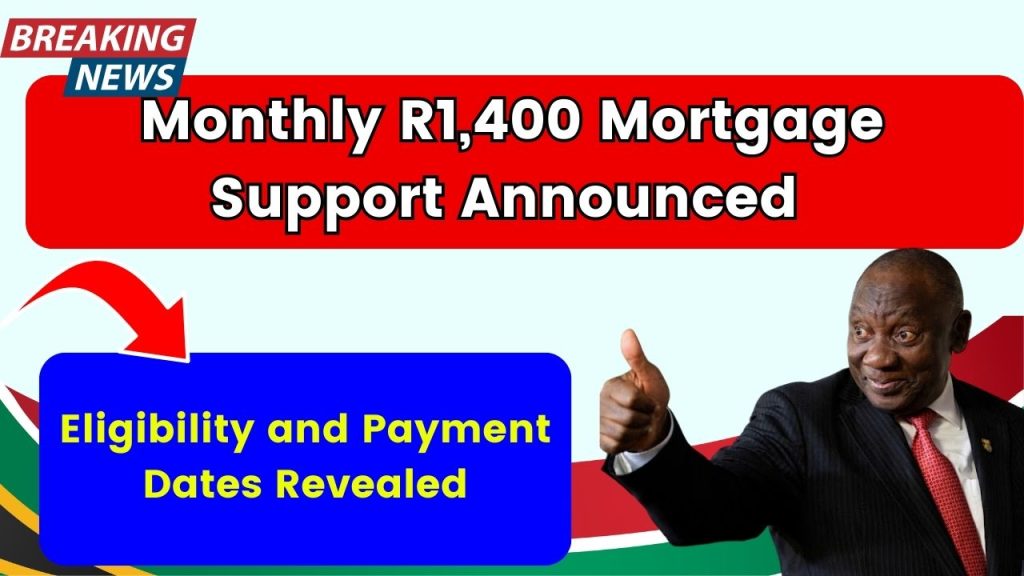Monthly R1,400 Mortgage Support Announced: As South African homeowners continue to grapple with rising costs, unpredictable markets, and the lasting financial effects of the COVID-19 pandemic, the newly announced monthly R1,400 mortgage support plan provides timely financial relief. Introduced in response to the South African Reserve Bank’s (SARB) series of interest rate reductions in 2025, this initiative is not only about lowering costs but empowering individuals and families to manage their debt and invest in a more stable financial future.

This support is especially beneficial for those with variable-rate home loans, whose repayment amounts shift depending on the prevailing interest rate environment. With the SARB signaling a more accommodative stance this year, many South Africans stand to save significantly on their monthly mortgage obligations.
In this comprehensive guide, we cover everything you need to know about the R1,400 monthly mortgage support, including eligibility, payment schedules, and actionable tips for maximizing the financial benefit.
Monthly R1,400 Mortgage Support Announced
| Feature | Details |
|---|---|
| Monthly Relief Amount | Up to R1,400/month |
| Effective Date | Following each SARB rate cut |
| Eligibility | South African citizens with active variable-rate mortgages |
| Loan Type | Only variable-rate mortgages automatically qualify |
| Credit Standing | Good repayment history recommended |
| Official Resource | South African Reserve Bank (SARB) |
The monthly R1,400 mortgage support presents a rare and significant opportunity for South African homeowners to reduce debt, build financial resilience, and optimize their long-term wealth strategy. Whether you’re a first-time buyer or long-time property owner, these interest rate reductions should encourage a proactive review of your financial arrangements.
By understanding your loan structure, staying updated on economic policy, and consulting professionals when needed, you can transform this temporary relief into lasting financial improvement.
What Is the R1,400 Monthly Mortgage Support?
The so-called “R1,400 monthly mortgage support” isn’t a direct government grant or relief fund. Instead, it represents a cost-saving opportunity triggered by the SARB’s recent and projected cuts to the repo rate, which is the interest rate at which the Reserve Bank lends to commercial banks. As the repo rate drops, banks follow suit by reducing the prime lending rate, affecting any credit products linked to it — like variable-rate home loans.
As of early 2025, SARB has outlined a series of potential rate cuts totaling up to 1.5%, a move expected to stimulate economic growth and reduce the burden of debt for consumers. For a typical mortgage of R1 million over a 20-year period, this could mean monthly savings between R1,200 and R1,400.
Example: Consider a homeowner paying R9,984 per month on a R1 million bond at a 10.75% interest rate. If SARB cuts the repo rate by 1.5%, this could reduce their mortgage interest rate to 9.25%, decreasing the monthly payment to R8,576 — a monthly saving of R1,408, or R16,896 per year.
The actual savings will depend on your outstanding loan amount, repayment period, and the margin your bank applies to the prime rate.
Who Qualifies for the Mortgage Relief?
The support is automatically applied to qualifying individuals. Here’s a detailed look at the eligibility criteria:
South African Citizenship
Applicants must be South African citizens or permanent residents with valid identification documentation. Temporary permit holders and foreigners may need additional proof of residency and loan compliance.
Active Mortgage on Record
Only those with a registered home loan account that is active and in good standing with a South African financial institution will qualify. This includes both new loans and existing ones.
Variable-Rate Home Loan
To benefit from the SARB-driven savings, your mortgage must be pegged to the prime lending rate. If you have a fixed-rate loan, your payments remain unchanged regardless of SARB decisions. However, you may explore refinancing or bond switching to gain access to a variable rate.
Good Credit Standing
Although SARB rate cuts apply universally, borrowers with a good credit score often receive better interest rate margins from lenders. Those seeking to refinance may find it easier with a clean credit record and consistent payment history.
Tip: Check your credit score through services like TransUnion or Experian to understand where you stand.
When Will the Lower Payments Begin?
The reduced mortgage repayments will take effect following each official SARB interest rate announcement. The Reserve Bank convenes its Monetary Policy Committee (MPC) roughly every 60 days. Once a rate cut is implemented, banks adjust the prime rate, which is reflected in your next monthly repayment cycle.
Timeline Example:
- April 2025: SARB announces a 0.5% repo rate cut
- May 2025: Banks implement lower prime rates
- June 2025: Borrowers see the reduction reflected in mortgage statements
Banks typically notify customers of changes in repayment amounts via SMS, email, or account statements. If you’re unsure, contact your lender’s bond department.
How to Take Advantage of the Savings
Here’s how you can use the rate reductions to maximize your financial position:
1. Audit Your Mortgage Details
Review your loan agreement or speak with your bank to confirm whether your mortgage is on a fixed or variable rate. Fixed-rate holders may request quotes to refinance into a more flexible structure.
2. Allocate Savings Strategically
Avoid spending your mortgage savings frivolously. Instead:
- Pay extra into your bond to reduce total interest and shorten the loan term.
- Eliminate high-interest debt, such as credit cards or personal loans.
- Grow your emergency fund to cover 3–6 months of living expenses.
- Invest in retirement annuities or unit trusts to generate long-term growth.
3. Track SARB and Economic Indicators
Stay informed with regular updates from the SARB website and financial news outlets. Understanding macroeconomic trends can help you plan your finances proactively.
4. Get Professional Advice
If refinancing or bond switching feels overwhelming, consult with a certified mortgage originator or independent financial advisor. They can provide tailored solutions to improve your financial stability.
Bonus Tip: Some banks offer reduced bond registration fees during rate cut cycles — ask your lender if promotions are available.
Benefits of the Mortgage Relief
The financial and personal advantages of this policy are extensive:
- Lower Monthly Repayments: Immediate relief of R1,200 to R1,400 per month.
- Greater Loan Flexibility: Lower payments improve affordability, making it easier to apply for new credit.
- Improved Financial Wellness: Freeing up cash means more room in your budget for goals and emergencies.
- Reduced Interest Costs: Making extra payments on a lower interest rate reduces the total cost of your home loan.
- Boost to National Economy: Higher consumer confidence often leads to greater spending and investment.
SA Homeowners Can Save R1400 on Their Mortgage in 2025 – Check Eligibility Criteria
Homeowners in South Africa can save up to R1400 on their mortgage in 2025 – Check Process
Big Changes Coming to South Africa’s Road Laws in 2025 – Are You Ready?
FAQs About Monthly R1,400 Mortgage Support Announced
Is this a government grant?
No. It is a market-driven benefit tied to SARB’s repo rate decisions, not a formal relief program or subsidy.
Do I need to apply for this support?
No application is necessary if you already have a variable-rate mortgage. The rate changes apply automatically. Fixed-rate holders will need to refinance to benefit.
What if I have a poor credit record?
You may still benefit from automatic rate reductions. However, options to switch loans or refinance might be restricted. Work on improving your score by settling arrears and reducing credit usage.
Can tenants or renters benefit from this?
No. Only individuals with registered home loans are eligible. Tenants should speak with landlords about potential rent adjustments.
Where can I check SARB’s interest rate updates?
You can find official updates at the SARB website, or through reliable financial portals like Fin24 and BusinessTech.











